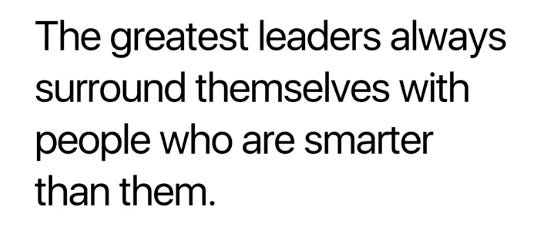It’s one of those old leadership saws we just accept as certified wisdom: “Hire people smarter than you.” CEOs hear it (and repeat it) all the time.
Interviewer: “What’s the secret to your success?”
CEO: “I just hired people who were a lot smarter than me!”
What could be wrong with that? Well, apart from the fact that here the CEO is, essentially, portraying themselves as charmingly humble to avoid answering in any substantive way, there’s also a flaw in reasoning.
I think when people say leaders should “hire people smarter than them,” they usually mean one of two things.
The first can be an important lesson for leaders, which is that you must overcome the resistance to hiring people who might outshine you… if you have such a resistance in the first place. I’m sure there is some percentage of CEOs out there who shred the resumes of people who they worry will make them look incompetent. It’s an acknowledged human flaw that some of us always need to be the “smartest person in the room.” If that’s your personality type, you do need to, at least in part, take the “Hire people smarter than you” adage to heart.
However, the great majority of CEOs I know would jump at the chance to have a genius—in marketing, in sales, in customer success, in finance, etc.—on their executive team or in the company. It’s not because these CEOs are inherently humble people but because they know it’s in their best interest. If someone has the ability to deliver competition-beating results for the business, they’re hired.
But this leads to the second meaning leaders have when they say they hire people smarter than them, and the primary issue I have with the saying. Underneath this statement is the assumption that “If we get enough raw brainpower on the team, our problems will solve themselves.”
Not so, in my experience. Not so at all.
Why the Platitude Is Flawed
Imagine you’re listening to Gregg Popovich on a podcast talking about his record-setting career as an NBA coach. He explains that his strategy was simply to recruit players taller than him.
Huh?
Keep reading with a 7-day free trial
Subscribe to Managing The Future to keep reading this post and get 7 days of free access to the full post archives.








